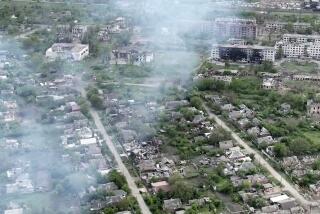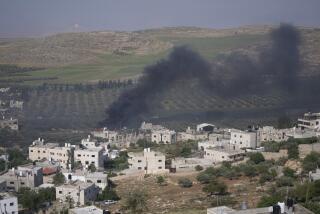Deadly attack on Roma community in Ukraine is blamed on neo-Nazi youth
- Share via
Reporting from Kiev, Ukraine — A violent attack on a Roma encampment in forest lands outside the western Ukrainian city of Lviv has left a 24-year-old man dead and four others injured, including a young boy and a pregnant woman.
The attack late Saturday was the latest and by far the most violent in a string of attacks on Ukraine’s Roma communities, an itinerant ethnic group sometimes called Gypsies.
For the record:
11:30 a.m. June 26, 2018An earlier version of this article misidentified the man killed in the attack as David Pap, 23. Pap, who is 19, survived the attack. The man who died was 24 and has not been identified.
Authorities said seven masked men, believed to be associated with a neo-Nazi group, attacked the Roma community with knives, chains and metal rods, fatally stabbing a man and seriously injuring a 10-year-old boy. A police video showed the encampment of tents and wagons was badly damaged in the attack.
It was the fifth attack on a Roma settlement in the last two months.
“The attackers executed one man and got to the next one who is now in hospital,” Roma rights advocate Mykola Yurchenko said. “The guy, 19 years old, did not even try to run, he was standing on his knees begging for mercy, but then the police arrived.”
The suspected assailants were apprehended along with a 20-year-old organizer, police said. Authorities said the attackers called themselves “sober and angry youth” and are affiliated with the Misanthropic Division, one of many neo-Nazi groups that have mushroomed throughout Ukraine in recent years.
The attackers also referred to themselves as Lemberg Jugend, or Youth of Lemberg, a reference to Lviv’s name when it was part of the Austrian empire and a phrase that mimics the moniker of “Hitler Youth,” Ukrainian media reported. The group posted a video titled “A Small Report From a Gypsy Safari” on its YouTube channel, but it was removed shortly after the suspects’ arrest, police said.
Though Ukraine lost almost a fifth of its population during World War II, some descendants of the soldiers who fought German Nazis now sport swastika tattoos and shave their heads, and white supremacist and neo-Nazi groups have become feared forces in the country.
Hundreds of the activists, soccer fans and ultranationalists formed the Azov Battalion, a paramilitary force that has been fighting pro-Russia separatists in the eastern provinces of Donetsk and Luhansk since 2014. The battalion is credited by some with helping the Ukrainian military regain key areas.
They were “the only real political force in Ukraine that is ready to join the army and fight well,” said Nikolay Mitrokhin, a faculty member at the University of Eastern Finland in Joensuu and expert on the Russian-Ukrainian conflict.
Pro-Kremlin media in Russia, however, contend their military successes are a sign that Ukraine has become a haven for neo-Nazis who want to instigate a “genocide” of ethnic Russians.
“Russia benefits indirectly [from such reports] to keep Ukraine unstable, to tell the domestic audience that Ukraine is failing,” said Anna Hrytsenko, a human rights activist in Kharkiv, a city in eastern Ukraine.
Authorities and analysts were quick to blame Moscow for the attack on the Roma settlement.
“Russia may be behind” the attack, Vasily Hrytsak, head of the SBU, Ukraine’s top law enforcement agency. “We understand that Russians are always trying to play with the so-called interethnic issues.”
The far-right ideology in Ukraine is rooted in the nationalist movement of the early 1990s, when the first generation of post-Soviet politicians lionized anti-communist figures who collaborated with German Nazis during World War II in their effort to carve an independent Ukraine out of the Soviet empire.
In recent years, thousands of far-right activists have marched with torches and raise their hands in a Nazi salute during officially sanctioned rallies in city centers. Ukraine’s top law enforcement officials, including Interior Minister Arsen Avakov, have been criticized for being too lenient on the groups.
In mid-June, about 150 nationalists with the group C14 blocked a street in central Kiev, the Ukrainian capital, to halt a LGBTQ march. They clashed with riot police and assaulted the officers with tear gas, police said. Dozens were detained but never charged.
In late April, C14, whose name is derived from a 14-word white supremacist slogan, announced that its activists had attacked and burned a Roma encampment in a Kiev park, forcing residents, including women and children, to flee.
Three more attacks on Roma encampments took place in Kiev and two Ukrainian regions.
Mirovalev is a special correspondent.
More to Read
Sign up for Essential California
The most important California stories and recommendations in your inbox every morning.
You may occasionally receive promotional content from the Los Angeles Times.










